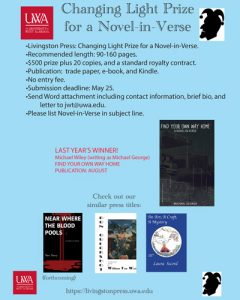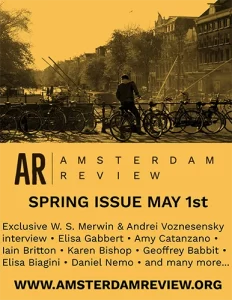Aufgabe – 2010
Number 9
2010
Annual
Sima Rabinowitz
An engaging and provocative issue of this ever-impressive annual. This year’s portfolio of international writing features contemporary Polish poetry selected by guest editor Mark Tardi, complex and inventive work worthy of serious reading and sustained attention. Another portfolio guest edited Laura Moriarty presents the work of “A Tonalist” poets; and guest editors E. Tracy Grinnell, Paul Foster Johnson, Julian T. Brolaski and contributing editors Jen Hofer and Nathalie Stephens selected the work of three dozen other poets and a number of unconventional review essays.
An engaging and provocative issue of this ever-impressive annual. This year’s portfolio of international writing features contemporary Polish poetry selected by guest editor Mark Tardi, complex and inventive work worthy of serious reading and sustained attention. Another portfolio guest edited Laura Moriarty presents the work of “A Tonalist” poets; and guest editors E. Tracy Grinnell, Paul Foster Johnson, Julian T. Brolaski and contributing editors Jen Hofer and Nathalie Stephens selected the work of three dozen other poets and a number of unconventional review essays.
Translations from the Polish are astounding, especially considering how challenging creating the English versions must have been (the originals do not appear in the issue). Consider, for example, the difficulties the original would pose for “self-portrait by a potter’s wheel” by Aneta Kaminska, translated by Katarzyna Szuster:
i – the shaper of lines
i – the verse of clay
a cluster plaster clings
and the wheel’s –
been
angling
or for Miron Biatoszewski’s “Addition by Subtraction,” translated by Mark Tardi:
today’s I
today’s most possible-me
wants the immediacy of fulfillment
before sleeping into meteomorrowness
The work – short poems, longer poems, prose poems, poems with unusual graphic elements, poems in dialogue, poems that explore the limits of language, poems that posit large and small philosophies, poems that explore the limits and the potential of the speaking self – is stunning and fascinating. The difficulty of obtaining translated work of contemporary poets outside of the US makes this issue all the more valuable.
Also fascinating is the portfolio of “A Tonalist” poems accompanied by an essay by the leading proponent of the A Tonal, Laura Moriarty. I can’t say that I understand what A Tonalist poetry is, even after reading her introductory essay, “A Tonalist Coda,” in which she classifies A Tonalist as an attitude or a context and not a set of techniques. The only formal association with A Tonalist (also called A Tonal) poetry is a blog, which seems appropriate since A Tonalist has something to do with place and nothing to do with place, according to Moriarty – a lot like cyberspace, which is and isn’t a location. To help define the term, Moriarty quotes from her own poem “A Tonalist Rules”:
A tonalist rules
For the game
When we are unafraid
Narrative coincides with meaning
Flatly in love with
Rhetorical continuity interrupted
Only to be taken back up
Like two things in one
Judging by the poems included in her selection, I would say that A Tonal has to do with sound (tonal, of course), disruption of normal expectations, narratives turned inside out through fractured syntax and meaning linked across and beneath the surface of words and phrases that often takes as its own subject subversion of traditional narrative. As with many things, it is easier to say what is not A Tonal, rather than what is. A poem from another section of the journal by Rick Snyder, “Testimonials” would likely not be considered A Tonal (“A minor American poet of middle antiquity. Dates unknown. / Fl. during the first great swirl. His lines about the red leash / were noted by one reviewer and emphasize the human / inability to discern smells.’’), but work by French poet Michel van Schendel, translated by Natalie Stephens, also appearing outside of the A Tonal portion of the journal, might be (“le monde un monde // parmi tant // détaché attaché dépecé // the world a world // amid many // detached attached dismembered”). Or is there too much conventional continuity here?
Jocelyn Saidenberg’s A Tonalist poem, “Our Community:” begins:
Or, our narrative of relevance
On poetic communities, for we are the relevant.
Or, haven not haven.
The A Tonalist work is certainly consistent with Aufgabe’s editorial predilection for provocative, evocative poetry that seeks to disrupt convention, defy expectation, and even startle, but in the service of meaning and communication, rather than to deliberately confuse or obscure. Work in this issue of Uruguayan poet Virginia Lucas, Slovenian poet Tomas Salamun, Mexican poets Dolores Dorante and Rodrigo Flores, and poems in English by three dozen talented poets, in addition to the Polish portfolio and the A Tonalist selections, is consistent with this editorial stance and makes for exceptional reading.
Finally, the late Leslie Scalopino makes what must certainly be one of her last appearances in print in this issue, published just prior to her death. She is interviewed by Michael Cross. They begin with a discussion of her early and influential considering how exaggerated music is and her assertion in autobiographical writings published that she had not read any poetry like the poetry she was writing – a conversation that couldn’t be more appropriate for the final pages of one of the most original literary journals around.
[www.litmuspress.org/]




